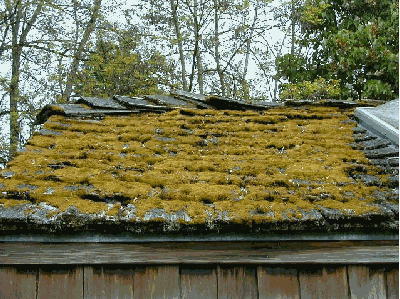It is quite common for Maine homeowners and landlords to receive a recommendation from their insurance company to remove moss growth from the roof of their building. Usually, this occurs following an inspection by the insurance company. Here’s some background on the issue, and what options you may have in dealing with it.
Does Moss Damage Roofs?
While there has not been much scientific study on the subject, most roofing professionals believe that moss is harmful to roof surfaces. Since most Maine homeowners insurance and landlord insurance pay for water damage and ice dams, insurance companies are understandably concerned with the subject. You may think they’re being picky, but insurance companies are in the business of reducing risk – theirs, as well as yours.

According to Oregon State University, roofing professionals say that the root-like structures of moss grow into cracks into roofing material, accelerating degradation and causing leaks. Moss can also hold moisture on your roof, allowing mold and rot to take hold. Finally, moss can grow under the edges of your roof shingles, loosening them and allowing water to enter.
How to Remove Moss from Your Roof
The University of Minnesota Extension shares that you should scrape away as much moss as possible. A power washer may work. Be careful not to damage your roof in the process. If you’re unsure, hire a professional to remove the moss. You can also use a commercial moss removal product. Most contain zinc sulfate, and are most effective when the moss is actively growing. Be careful: zinc can corrode some metals, including copper. Minnesota Extension cautions you to NEVER use table salt on your roof: it is corrosive to metal, and not effective at controlling moss.
How to Keep Moss from Growing on Your Roof
- Keep leaves, branches and other debris off your roof.
- Remove overhanging branches (or hire an arborist to do it). Moss thrives in a dark, damp environment. Direct sunlight and good aeration prevent moss growth.
If Your Insurance Company Requires Removing Moss from Your Roof
Insurance companies can be like spouses. A “recommendation” means “do it, if you know what’s good for you”. An insurance company can (and often will) cancel your insurance for failure to respond to reasonable loss control recommendations.
If you receive ANY recommendation from an insurance company – about any situation – talk to your agent (you DID buy your insurance from a local agent, right?).
- Ask them for their advice. They can tell you how urgent the situation is, and whether this is something that all insurers would require.
- They may be able to recommend a local contractor or resource to help.
- They can communicate with the insurance company on your behalf.
- If you need more time than the insurance company has allowed, your agent may be able to negotiate that for you (depending upon the severity of the situation).
- If you’re unable or unwilling to complete the recommendation, your agent can discuss your insurance options.
The Bottom Line
When all is said and done, you don’t HAVE to make the repairs or changes that your insurance company tells you to. But, they don’t HAVE to insure you if you don’t.
Most preferred insurance companies in Maine have similar underwriting requirements, but some underwriters are pickier than others. Also, depending upon your circumstance, you may be willing to have less coverage, a higher deductible, or pay a higher rate to keep your property “as is”.
If you have questions about Portland Maine area insurance, contact Noyes Hall & Allen Insurance. We have represented many insurance companies, and served the community for more than 80 years. We have the experience to help you make an informed decision.

